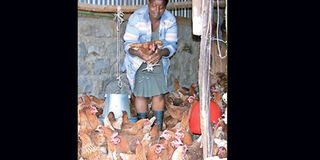How I beat cold weather to get more eggs from my chickens

Magdalene Wanja inspects her chicken in her farm in Thika. When temperatures are low, birds tend to eat more to generate heat. However, when the birds, for instance layers, cannot find enough food then, they will stop laying eggs. PHOTO | LEOPOLD OBI | NMG
What you need to know:
- The secret is providing them with plenty of quality feeds, keeping them warm and ensuring their house is clean.
- Magdalene phased out all the flock after which she disinfected the coop and brought new 700 layers at the beginning of this year.
- Across the country, the recent chilly weather and heavy rains made many poultry farmers grapple with numerous fowl diseases, prompting them to use antibiotics unnecessarily.
- The most common poultry diseases during cold seasons include pneumonia, diarrhoea and coccidiosis.
Maporomoko estate, off Thika-Gatanga Road, is an idyllic middle-class suburb, where a good number of residents are taking up farming thanks to ready market in Thika Town.
Magdalene Kinyanjui is one of those in the estate keeping poultry and supplying eggs to tens of shop across the town.
“Every morning, I collect eggs and clean the feeders, feed the birds before I do other tasks,” says the farmer who collects 22 trays of eggs daily from her 700 layers. She sells the eggs at Sh300 per tray.
Many farmers have been witnessing declined production in their flocks due to recent cold weather, but Magdalene says her flock has maintained productivity since the start of the rains in March.
“The secret is providing them with plenty of quality feeds, keeping them warm and ensuring their house is clean. I clean and disinfect the poultry house on weekly,” she notes, adding that during the cold weather, the birds must feed well to generate heat to keep their bodies warm.
When she ventured into poultry farming in September last year, she had no idea of poultry farming.
“I didn’t know much about poultry health and vaccination, so I didn’t not follow the required vaccination regimen. One day I woke up to find half of my flock dead. A veterinarian later informed me the bird had died of coccidiosis.”
Magdalene phased out all the flock after which she disinfected the coop and brought new 700 layers at the beginning of this year.
She also sought the expertise of a vet officer who regularly visits her farm, and through that move, she has been able to ward off poultry diseases one season at a time.
Across the country, the recent chilly weather and heavy rains made many poultry farmers grapple with numerous fowl diseases, prompting them to use antibiotics unnecessarily.
COLD SEASON DISEASES
However, unnecessary use of antibiotics reduces the farmer’s profit margins due to costly expenses and they are also detrimental to health of consumers of the chicken product.
Dr Ochien’g Odede, a senior vet and technical director at Sidai Africa, advises poultry farmers to observe proper management regimen so that they do not use antibiotics on their birds, especially during this rainy season.
The move will ensure their flock remains healthy without spending a coin purchasing drugs.
The most common poultry diseases during cold seasons include pneumonia, diarrhoea and coccidiosis.
“Farmers must ensure they keep the birds warm by turning on the brooder in case they have chicks or providing the birds with enough water and food,” he says, adding it is important to increase food ration for their birds during the cold weather.
When temperatures are low, he points out, the birds tend to eat more to generate heat. However, when the birds, for instance layers, cannot find enough food they will stop laying eggs.
“Birds can develop respiratory diseases including pneumonia when they stay on wet litters.”
Dr Victor Yamo, a human and animal protection manager at World Animal Protection, says that most notifiable poultry diseases are best controlled by proper and effective vaccinations.
“For an effective vaccination to be done, the farmer should ensure that they source vaccines from a reputable source and that the vaccine is enough for the number of birds in the flock.”





